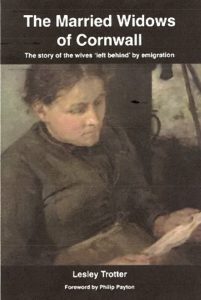'The Married Widows' is a term describing the wives 'left behind' by their husbands who departed England to seek work and/or new lives overseas. The men usually intended to return home with an improved financial postion, or looked to establish themselves in new homes and communities and send for their wives and children later on. This was not always the case, quite often the separations became permanent.
The concept of 'left behind' is also interesting. This tends to imply a passive role for the women, but in many cases they were active participants in the decision, sometimes refusing to go, but more often agreeing to maintain the family at home until the whole family could eventually be reunited in better circumstances.

Dr Lesley Trotter, a historian and genealogist, has conducted extensive research on this phenomenon of family separation in 19th century Cornwall and sets out the findings in her fascinating book, The Married Widows of Cornwall: the story of the wives 'left behind' by emigration.
What skills and resources could the wives and families turn to in the face of long term absences of the key family-breadwinners? Were destitute wives forced into prostitution, or families bundled off to the workhouse? Dr Trotter provides new perspectives and many first hand stories on how the wives and families survived at home while husbands worked overseas, some sending home money (and quite a few not), others dying overseas and more again drifting apart and never reuniting. Dr Trotter uses a broad range of resources in her research and is still keen to hear from family historians with stories to tell of their own married widows. Although the book is based on Cornish research, the findings resonate for those researching in other counties as well.
In talking to Dr Trotter, Stephen Hawke, the convenor of the GSV's South West England Research and Discussion Circle (SWERD) found that, from her research Dr Trotter knew of his great-great-grandfather's wife and daughter left behind in Cornwall, but as he never went back she didn't know the Australian end of the story. Stephen observes that:
'Her book has set me rethinking the family story and opened up some new aspects for research.'
The next meeting of the South West England Research & Discussion circle will discuss Dr Trotter's book and how her findings relate to our own family stories or perceptions of Married Widows, those left behind when our ancestors first ventured to these shores. It is often difficult to find women's stories in family histories and Dr Trotter's research is a valuable resource which helps bring their lives and voices to the fore. Dr Trotter is keen to have feedback from discussion of the book and hopes that those attending this session can bring their own stories. The SWERD meeting (free for for GSV members) is on Wednesday 13 February, 12:30 - 2:00pm at GSV.
***

